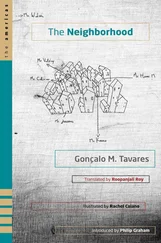A boyfriend and girlfriend are guessing at sentences that the other makes up. It’s a game: he writes something down on a piece of paper, then hides what he’s written; she guesses what it is, and they compare the two; they laugh at the results, whenever they’re completely different, laugh at the predictability or unpredictability of their ideas.
Moving successively, purposelessly, the woman’s elbows manage to knock over a glass of wine; she bursts out laughing, and the man apologizes to their waiter and says that he’ll pay for everything.
Hidden passions are revealed by reckless kisses. Formulaic amorous phrases are repeated, sentences copied from someone else, but which, when spoken or heard in isolation, become essential, capable of occupying a person’s thoughts for an entire week. In times of little imagination a new science is constructed: the formulation of love in a series of phrases: like an experimental study in which one already knows, with absolute certainty, what practical effects or moral consequences certain phrases have on the body of a man or a woman on a Saturday night. A night when the city, protected as it is by soldiers, seems inaccessible to death, which has a way of humbling the joys of even the victorious or indifferent.
Periods of great fear are good for more than just survival: they’re also good for passion. But if the quality of an entire generation can be measured by the quality of the phrases that its seducers utilize, then this generation, without a doubt, was a mediocre one.
Inseparable from a certain violence (as if it were its counterpoint), these seductions are made up, on these particular nights, of well-aimed blows, so to speak, that hit their targets in that part of existence which lies outside oneself. In every moment of respite from serious illness or fear, people head out to the streets, people sing; adolescents spy through keyholes to inspect the limits of their morality as well as the unashamed nudity of their housemaids; after advancing decisively through unsafe locations, soldiers learn dance-steps, useless steps, though steps that could, nevertheless, efficiently seduce even the most resolute women; the soldiers listen to their dance instructor the way they used to listen to the officers who taught them other sorts of steps, another way to walk across this earth.
Since an explanation of all existence can’t fit on a single tabletop, two soldiers opt instead for more beers, which fit nicely, and their dates can’t stop smiling, drunk, their bladders full and their breasts swollen. People leave their houses to search for perfection and, indeed, they find soldiers — whose deadly weapons seem reduced now to a mere detail in their wardrobe — and even find women who’ve been abandoned by their courageous or dead husbands, and who, confused, mix incompatible styles in their chosen attire, as well as in their fluctuating demeanors: meaningful stares, typical of prostitutes, accompanying phrases spoken using absolutely perfect, refined grammar, voicing their eloquent anxieties about the “instability of the current political situation.” The women are debasing themselves. These men are from other cities; they’re merely passing through.
But joy doesn’t yield. The two lovers endeavor to inaugurate a new century, one belonging solely to their table: a private century. A stupid woman, with her ill-mannered elbows on the table, and with her dress already marked by two wine stains, that woman, who earlier in the afternoon was disparaging the humanity of people whose names she can’t even spell, is now rubbing her high-heeled shoe against a soldier’s boot, emulating the behavior of people she’s seen in films; and she’s already feeling a certain sort of feminine desire begin to express itself in the area above her knees.
Normality continues apace; no one disturbs it, as there’s a constant need to keep moving, which, from a distance, seems incomprehensible, almost absurd. Normality continues trudging apace, even on top of ruins; the human organism endeavors to maintain its habits, even in the strangest and most confusing situations. Men do not stop for a single minute, whether they’re satisfied or trying to adapt to a new element; indeed, this is the reason that they get out of bed. And since they have desires they’ll never stop searching. Searching for what? That which has been stolen from them.
It was in the midst of this urgency of normality that emerges at the most dynamic times, those days whose borders most readily allow for important actions to be taken within them — as if time contained a specific volume, which can be either volatile or concentrated — it was in the midst of this urgency that the dice game, for example, was organized, the game that Joseph Walser participated in every Saturday night. The game was a habit that predated the soldiers’ invasion of the city, and had continued afterward, without any significant changes.
The rules of an autonomous world, a closed world, do not change, especially when unpredictability occupies a central place in each day in the outside world.
In opposition to the administration of their country, every man in time of war, individually, on his own, founded, as it were, a Ministry of Normality, which established, essentially, repetitions. Because only repetitions calmed their minds, only repetitions allowed each individual to wake up to find themselves human the next day. Repetitions of small actions or small gestures, of banal words or phrases — even repetitions of invisible acts, acts that weren’t noted by other people, like repeated images and memories in one’s brain, all of which allowed each person to survive in the midst of chaos, stand fast in the midst of the reigning disorder, in the midst of that which Klober was wont to call a century of unpredictability , a century that wasn’t merely opposed to repetition, but was the enemy of repetition . “This is not a normal century,” Klober often said, “but men in this century are still the same as they always were.” And that was it, that mixture: these were men who had been invaded while repeating the essential actions of generations past — and this is a precise use of the word invaded , for it describes both the directional flow and the speed of the movements under discussion — and, through this invasion, found themselves invaded as well by completely new phenomena.
“No prophet ever so much as correctly predicted the color of shoes in our century,” mocked Klober.
The city was bustling, and the sounds from the Saturday night revelry were coming in through the windows of Margha and Joseph Walser’s house.
Margha looked at the clock in the living room and then at her husband.
“It’s already nine o’clock. What about your game?”
“I’m not going today,” said Joseph Walser.
On that Saturday night three men were arrested in Fluzst’s house. Fluzst himself, Normaas, and Rolph. Normaas and Rolph were arrested on charges of “knowledge of important information” and “friendship with members of the resistance.” At four o’clock in the afternoon on Sunday, Fluzst was executed by a firing squad.
On that night, of the five regular dice players, both Joseph Walser and Strumm were missing. These two men had disrupted their normality by not showing up, as was their habit, at Fluzst’s house.
Seated around the table, Fluzst, Normaas, and Rolph began to think that Joseph and Strumm’s lateness was odd. Their lateness was, after a certain point, “surprising,” given that neither of the two had sent word. When they heard someone knocking on the door, the feeling of oddity disappeared and the sensation of normality was, for a few moments, restored. Normaas was the one who, with his customary good nature, went to answer the door. He opened it with a joke in his head about the two missing players’ unpunctuality. He never got to say anything. It was the soldiers.
Читать дальше












